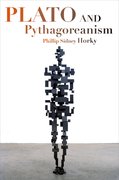As promised, here is preview of the paper I’ll be giving in the Plato’s Academy Conference at the University of Athens on 14 December (9:30-10:10 in the Ioannis Drakopoulos Auditorium), on the modalities of ‘appropriation’ of Pythagorean philosophy in the Early Academy:
From the very earliest sources in Athens, we see diverse approaches to the ‘appropriation’ of Pythagoreanism: the Socratic philosopher Antisthenes of Athens, who celebrated the rhetorical dexterity of Pythagoras, and who cast him as a figure whose activities exemplified the claim that ‘to discover the mode of wisdom appropriate to each person is the mark of wisdom’ (τὸν γὰρ ἑκάστοις πρόσφορον τρόπον τῆς σοφίας ἐξευρίσκειν σοφίας ἐστίν).[1] Here, Pythagoras’ civic performances in Croton – whatever historical veracity they might obtain – seem to be elicited in order to demonstrate his exemplarity as an orator, a πολύτροπος who, like Odysseus, is able to intuit the best way to speak to his audience, and tailor his speech accordingly.[2] This, according to Antisthenes, is a sort of higher order wisdom in itself, under which fall other sorts of wisdom. But even from the earliest response to Pythagoreanism, in the dialogues of the Socratic Antisthenes, we can see that Pythagorean wisdom was, itself, inherently thought to be appropriable to the object of its persuasion.[3]
The fact of the appropriability of Pythagoreanism to its audience, evident in Antisthenes’ fragments, might help to explain why Pythagoreanism was so open to diversity of interpretation in the intellectual culture of late 5th-Century BCE Athens. Indeed, other intellectuals within the circle of Socrates were approaching Pythagoreanism with what might seem to us to be more exotic exegetical strategies. Another associate of Socrates, Aristippus of Cyrene, also focused on Pythagoras’ disclosure of the truth, but he cleverly employed an explanatory strategy based in allegorical etymologization of the sort found in the Derveni Papyrus and Plato’s Cratylus.[4] In a work entitled On the Natural Scientists, Aristippus claimed:
…he was named Pythagoras because he, no less than the Pythian, orated
the truth.”
Πυθαγόραν αὐτὸν ὀνομασθῆναι ὅτι τὴν ἀλήθειαν ἠγόρευεν οὐχ ἧττον
τοῦ Πυθίου.
(D.L. 8.21 = SSR IV A 150)
This strategy of interpretation of Pythagoras’ name, which was associated with riddling speech elsewhere in this period, is all the more striking given Aristippus’ refusal elsewhere to ‘solve a riddle’ (λῦσον αἴνιγμα), on the grounds that it already offers us enough trouble in its current ‘bound-up’ state (δεδεμένον).[5] Was Aristippus joking in the first case, or being flippant in the second? Perhaps Aristippus was aping a method of allegorical interpretation practiced by natural scientists of the stripe of someone like Metrodorus of Lampsacus, who was associated with Anaxagoras and the φυσικὴ πραγματεία in the traditions, and who engaged in forms of metonymical explanation of Homeric characters, both human and divine.[6] We cannot be sure.[7] Be that as it may, this testimonium shows that etymologization was a possible vehicle for explaining what the name Pythagoras – and potentially, by extension, Pythagoreanism – meant to some late 5th and early 4th Century BCE intellectuals engaged in current methods of critical analysis.
[1] V A 187 SSR. Cf. Zhmud 2012: 46-47.
[2] Of course, this tradition tends to be associated with Socrates more broadly, if we are to see in the discussion of legitimate rhetoric as ‘leading the soul’ (ψυχαγωγία) in Plato’s Phaedrus (271a-272b) as Socratic.
[3] The tradition that associates Pythagoras with excellence in oratory remains strong throughout the 4th and early 3rd Centuries BCE, being adopted by Dicaearchus (F 33 Mirhady) and Timaeus of Tauromenium (apud Justin 20.4), and extensively elaborated upon by Iamblichus’ source (Timaeus?) at VP 37-37.
[4] On allegorical exegesis in the Derveni Papyrus and its relationship to etymological exegesis in the Cratylus, see, inter alia, Struck (2004: 29-59).
[5] D.L. 2.70 = SSR IV A 116.
[6] DK 61 F 2, 4, and 6.
[7] Probably, much rides on what it means to ‘solve’ a ‘riddle’, which is difficult to contextualize for Aristippus. Boys-Stones and Rowe (2013) note that Socrates apparently refused to split hairs by appeal to eristics of the sort practiced by Eubulides, and that Antisthenes (DK 29 A 15, not in SSR), when presented with Eleatic arguments that being is unmoved, walked around rather than try to solve the five arguments given by Zeno, considering proof ‘through activity’ (διὰ τῆς ἐνεργείας) more concrete than proof ‘through arguments’ (δὶα λόγων).


